Chapter 4: Cupid’s Palace
Aiding his friend Cupid, the West Wind, Zephyr, comes and carries Psyche off. She is understandably fearaful (4a, a 16th century fresco by the Italian artist Giulio Romano, a pupil of Raphael’s, in the Palazio Te in Mantua; we are looking up at the ceiling).

When she is not hurtled down but rather borne aloft, she rather enjoys the experience (4b, by Proudon, 1808). The painting suggests the anticipation of first sexual experience, once she trusts the one initiating her.
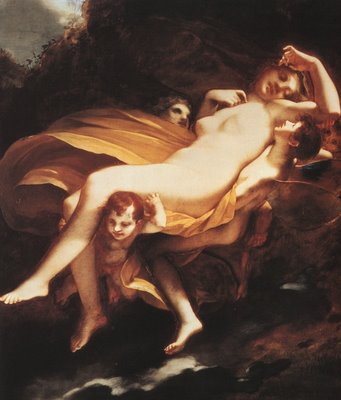
Zephyr sets her down next to a magnificent palace, with gardens (4c, by Burne-Jones) and elegant rooms.

Invisible hands bathe her (4d, at Ecouen Castle, near Paris, 1540’s).
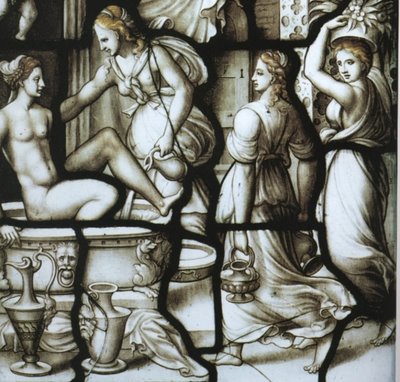
In alchemy this would be the container for the alchemical work, as in 4e, Emblem One of the 1558 Rosarium Philosophorum, Rose Garden of the Philosophers.

Then invisible voices reassure her and sing while other hands serve her delectable foods (4f, also from Ecouen Castle)

This is the girlish fantasy of being totally cared for, or of a return to divine childhood. It is also how to seduce a girl: take her for a ride in your private airplane, then wine and dine her in luxurious surroundings.
Yet contrary to the stained glass images, Psyche is visually alone. The hands and voices are like ghosts in a long occupied house now vacant. Psyche is so wrapped up in her fantasy that she does not see the creepiness. But some of that appears in von Gierke’s depiction of this setting in contemporary terms. First comes a painting entitled “Versprochene Hochzeit,” i.e. “promised marriage”(4g):

This one is followed by another, entitled “Stillleben mit Ausblick," Still life with View (4h):
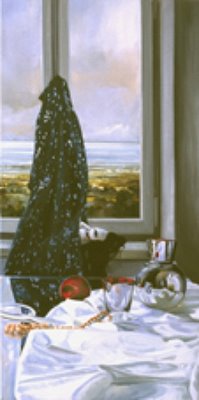
Again, there is one entitled “Interieur mit Stuhl,” Interior with Chair (4i):
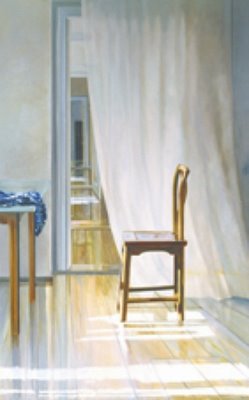
and 4j, entitled “Interieur mit Kleid,” Interior with Dress (4k)
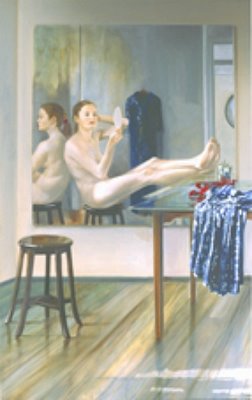
In this last, what do her feet rest on? There is an atmosphere that is hard to describe in these paintings --something like illusory grandeur and real emptiness. The works are very post-modern in their combination of exactitude and elusiveness.

When she is not hurtled down but rather borne aloft, she rather enjoys the experience (4b, by Proudon, 1808). The painting suggests the anticipation of first sexual experience, once she trusts the one initiating her.

Zephyr sets her down next to a magnificent palace, with gardens (4c, by Burne-Jones) and elegant rooms.

Invisible hands bathe her (4d, at Ecouen Castle, near Paris, 1540’s).

In alchemy this would be the container for the alchemical work, as in 4e, Emblem One of the 1558 Rosarium Philosophorum, Rose Garden of the Philosophers.

Then invisible voices reassure her and sing while other hands serve her delectable foods (4f, also from Ecouen Castle)

This is the girlish fantasy of being totally cared for, or of a return to divine childhood. It is also how to seduce a girl: take her for a ride in your private airplane, then wine and dine her in luxurious surroundings.
Yet contrary to the stained glass images, Psyche is visually alone. The hands and voices are like ghosts in a long occupied house now vacant. Psyche is so wrapped up in her fantasy that she does not see the creepiness. But some of that appears in von Gierke’s depiction of this setting in contemporary terms. First comes a painting entitled “Versprochene Hochzeit,” i.e. “promised marriage”(4g):

This one is followed by another, entitled “Stillleben mit Ausblick," Still life with View (4h):

Again, there is one entitled “Interieur mit Stuhl,” Interior with Chair (4i):

and 4j, entitled “Interieur mit Kleid,” Interior with Dress (4k)

In this last, what do her feet rest on? There is an atmosphere that is hard to describe in these paintings --something like illusory grandeur and real emptiness. The works are very post-modern in their combination of exactitude and elusiveness.

0 Comments:
Post a Comment
<< Home